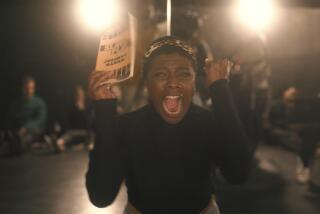âHomeâ a Classy Take on Civil Rights Struggle : Theater: The play, vibrantly delivered by an all-female cast, recounts a black girlâs coming of age in the South of the â60s.
âStamping, Shouting and Singing Home,â a vibrant new play for young people at the New Ivar Theatre in Hollywood, proves why the Mark Taper Forumâs Improvisational Theatre Project ranks among the finest youth theaters in the country.
From the spare grace of the set--a suggestion of weathered cabin wall, curved and folded like a scroll--to the remarkable four-woman cast, this multilayered celebration of women and the telling of the African-American struggle for equality is a class act.
Lisa Evansâ educational play, warmed with an abundance of rich gospel songs sung by the cast and leavened with unexpected humor, is set in the South of the â60s, when skin color still gave one group legal control over another.
Times were changing, however, and through the eyes of a young girl named Lizzie (Monica Guy), the fledgling civil rights movement and the history leading up to it are keenly observed in a seamless series of vignettes, directed with assurance by Peter C. Brosius.
Lizzie loves having her mother (stately Michele Mais) tell stories about great-great-grandmother Sojourner Truth and Harriet Tubman, but she would rather play than think about the prejudices that overshadow her life. But her older sister Marguerite (played with striking dignity by Shelley Robertson) is nourished and inspired by the stories.
She joins the fight for civil rights and prods Lizzie to think more deeply. When tragedy strikes, Lizzie finds her own sense of self and strength of purpose. Guy overdoes Lizzieâs childish elan occasionally, but her transition from innocence to understanding is on the mark.
Humor underscores the playâs messages, most notably in a barbed satire of the mythical happy slave--ever-smiling and praising the Lord. Mais and Vanessa Townsell also contribute as a twosome with their wickedly funny caricatures of bigoted white women.
One white woman employs Marguerite as a maid and humiliates her as a matter of course--âthey gettinâ so uppityâ--renaming her âMaryâ as a more fitting name for a âcoloredâ girl. When Marguerite gets even by putting salt in the sugar bowl, she is beaten. (A nod perhaps to Maya Angelou? The poet, whose real name was Marguerite, worked as a maid as a child and was renamed Mary by her employer, according to her autobiography âI Know Why the Caged Bird Sings.â)
Also observed, along with the arbitrary changing of a personâs name, are these daily humiliations: all-white school books that denied other races their place in history, and a popular culture that turned black caricatures into household knickknacks and used black actors as comic relief in movies.
Throughout, the castâs dynamic voices are lifted in song--to celebrate, to mourn, to comfort and inspire. (Musical director Stafford M. Floyd contributed new music and wrote the arrangements for the familiar gospel songs.)
Other elements contributing to the playâs strength include the set by Edward E. Haynes Jr., Suzanne Jacksonâs period costumes, Michael Gilliamâs poetic lighting and the dance-like movement choreographed by Gayle Fekete.
âStamping, Shouting and Singing Home,â for ages 8 and up, New Ivar Theatre, 1605 N. Ivar, Hollywood, Saturdays, 11 a.m. through March 27; this Sunday only, 2 p.m. $5-$7; (213) 972-7392. Other public performances: April 2-3: Cal State L.A. April 10: sponsorship by the Korean Youth Center, location to be announced. April 17: African Community Unity Church. Information: (213) 972-7662.
More to Read
The biggest entertainment stories
Get our big stories about Hollywood, film, television, music, arts, culture and more right in your inbox as soon as they publish.
You may occasionally receive promotional content from the Los Angeles Times.










